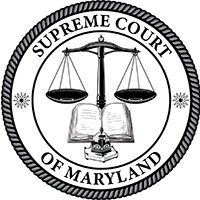SCHEDULE OF ORAL ARGUMENTS
September Term, 2017
Thursday, May 31, 2018:
Bar Admissions
AG No. 83 (2009 T.) Attorney Grievance Commission v. Walter Lloyd Blair
Attorney for Petitioner: Raymond A. Hein
Attorneys for Respondent: Robert Elmer Cappell and Walter Lloyd Blair
AG No. 44 In the Matter of the Petition for Reinstatement of Walter Lloyd Blair to the Bar of Maryland
Attorney for Petitioner: Raymond A. Hein
Attorneys for Respondent: Robert Elmer Cappell and Walter Lloyd Blair
No. 78 Allan Jackson v. State of Maryland
Issues – Criminal Law – 1) Did CSA err in holding that evidence had been properly authenticated, despite acknowledging that the evidence was not what its proponent claimed? 2) Can records of regularly conducted business activities be authenticated through inferences and “common knowledge,” even though Rule 5-902 requires “[t]estimony of authenticity”?
Attorneys for Petitioner: John McDermott and Brad Garcia
Attorney for Respondent: Peter R. Naugle
Friday, June 1, 2018:
AG. No. 9 Attorney Grievance Commission of Maryland v. Roger Norman Powell
Attorney for Petitioner: Lydia Lawless
Attorney for Respondent: Michael William Farlow
No. 77 In re: Adoption/Guardianship of C.E.
Issues – Family Law – 1) Does a CINA child have a protected interest in achieving a timely permanency plan of adoption that transcends his parents’ right to raise him, where the three (3) year old child has resided in the same relatives’ home since birth and where the trial court found, by clear and convincing evidence, that reunification is “unachievable … in the foreseeable future”? 2) Is it an error of law for a court to change a CINA child’s permanency plan in guardianship proceeding conducted pursuant to Family Law §5-323? 3) Was the court’s application of its findings of exceptional circumstances to justify custody and guardianship to relatives instead of using the exceptional circumstances to support a grant of guardianship, an error of law in contravention of the statute’s clear preference for adoption over custody and guardianship? 4) Did the juvenile court err when it failed to find that the CINA child’s father was unfit to remain the child’s legal father in light of its finding, by clear and convincing evidence, that there was no likelihood that father would ever be able to safely care for the child? 5) Did the juvenile court err as a matter of law in its exceptional circumstances analysis, by elevating an incidental “parental” relationship over the child’s best interests in achieving the permanence afforded by adoption?
Attorneys for Appellant: Joan F. Little and Janet Hartge
Attorneys for Appellee: Karl-Henri Gauvin and Jeffrey Dier
No. 79 Jason Adam Fallin v. State of Maryland
Issues – Criminal Law – 1) In a child sex abuse case, did the trial court err by allowing an expert witness in child abuse disclosure to opine that the alleged victim showed no “signs of fabrication or coaching” and that the expert had no concerns about fabrication in her pretrial interviews with her? 2) Did CSA incorrectly hold that its opinion in Yount v. State, 99 Md.App. 207 (1994) “narrow[ed]” this Court’s opinion in Bohnert v. State, 312 Md. 266 (1988), such that “it is clear that in certain scenarios, an expert witness may testify as to whether they believe one is fabricating or not”? 3) Was the trial court required to instruct jurors that the credibility of another witness is not a proper subject of expert testimony? 4) When the trial court allowed a non-licensed social services investigator to repeat what the alleged victim told her under the tender years exception to the hearsay rule, did CSA incorrectly hold that the error was harmless? 5) Did Petitioner fail to preserve his claim regarding the expert’s testimony where he did not make contemporaneous objections or request a continuing objection? 6) Did Petitioner fail to preserve or affirmatively waive any error in the trial court’s curative instruction where he suggested the language used by the court and, after the court gave the instruction and asked if it was satisfactory, he stated that it was?
Attorney for Petitioner: Wyatt Feeler
Attorney for Respondent: Sarah Page Pritzlaff
No. 80 Stanley Sugarman, et al. v. Chauncey Liles, Jr.
Issues – Torts – 1) Respondent’s medical expert opined that lead exposure caused cognitive deficits in two distinct areas measured on neuropsychological evaluation. But she conceded that the epidemiological data she relied upon did not show a causal association between lead exposure and either metric. Did CSA err when it held that her opinion had a sufficient factual basis? 2) Did CSA err when it held that the expert had sufficient basis to opine that lead exposure caused Respondent to suffer IQ loss? 3) The damages experts’ opinions that Respondent, a high school graduate accepted to two four-year colleges and enrolled in one, has incurred millions of dollars in loss of earning capacity were based on assumptions not supported by the evidence. Did CSA err when it concluded that Petitioner’s arguments regarding the insufficient factual and methodological bases underlying the expert’s opinions went to the weight, not the sufficiency, of the evidence?
Attorney for Petitioner: Michele R. Kendus
Attorney for Respondent: Bruce H. Powell
On the day of argument, counsel are instructed to register in the Clerk’s Office no later than 9:30 a.m. unless otherwise notified.
After June 1, 2018, the Court will recess until September 6, 2018.
BESSIE M. DECKER
CLERK

